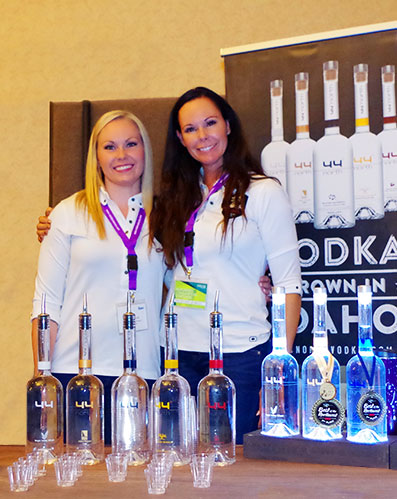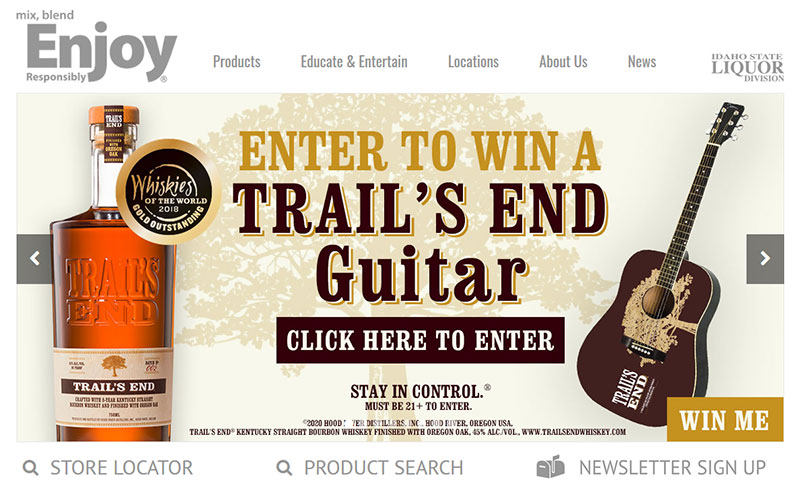Guidelines for Public Tastings

- In accordance with 23-509 Idaho Code, manufacturers can give liquor away as long as it is for sampling purposes. Further, IDAPA defines samples as “liquor furnished by industry… for the purpose of promoting the product.”
- The Idaho Administrative Procedures Act (IDAPA) states that samples shall be that which are permitted by federal regulation or statute. 23-509 Idaho Code, ‘Sample Tasting for Manufacturers of Distilled Spirits’, limits sampling size to onequarter (0.25) ounce. This statue does not preclude distillers from sampling offsite; it simply restricts them to pouring without the presence of a retail (quota) liquor license to the premises of their distillery.
- IDAPA also stipulates that no supplier representative, or anyone acting in that capacity, shall deliver any Liquor, Wine, or Beer sold by the Division to a Licensee’s place of business, other than Samples.
a. Such Samples shall be limited to sizes permitted by federal regulation
b. Such Samples shall be only those items not carried in that Licensee’s Product Line. This is applicable to the delivery of liquor that a retailer does not currently carry. The sampling of existing products which are currently carried by an on premises licensee can be acquired in accordance with §6.95 of the Federal Alcohol Administration Act.
The intent of the rule is not to infringe upon public sampling but to restrict suppliers’ interaction in their business dealings with licensees to new items only. As the public tasting is a promotional event geared toward the general public (and not the licensee), it is not a violation of the of the rule for suppliers to bring samples onto a licensee’s place of business, even if those items are carried in the licensee’s product line, so long as the samples do not come in contact with the licensee nor any of the licensee’s employees. - The Federal Alcohol Administration Act (Tobacco Tax and Trade Bureau, or TTB) §6.95, states that “An industry member may conduct tasting or sampling activities at a retail establishment. The industry member may purchase the products to be used from the retailer, but may not purchase them from the retailer for more than the ordinary retail price.” TTB §6.91 goes on to state that this amount is limited to not more than three (3) liters of distilled spirits. ISLD takes this to mean three liters per event. The number of events is not explicitly limited but should not be excessive to the point where they could be perceived as an inducement.
- Tied-House violations, also referred to as “inducements,” are understandably a concern; however, TTB §6.91 explicitly states that “the act of an industry member of furnishing or giving a sample of distilled spirits to a retailer who has not purchased the brand from that industry member within the last twelve (12) months does not constitute a means to induce within the meaning of tied-house violations.
- What are the Legal Requirements with Respect to Furnishing Retailers with Things of Value?
An industry member may not furnish, give, rent, lend, or sell to a retailer any equipment, fixtures, signs, supplies, money, services, or other things of value*, subject to the exceptions listed under Subpart D of part 6. Exceptions found under Subpart D identify promotional support items such as product displays, point of sale advertising materials, equipment and supplies, and other items and services that are considered not to be an unlawful inducement under § 6.21(c) only. Sampling is listed as an exception to, not a violation of, this code.
* Anything of value refers to any goods that have a certain utility to the recipient that is real and that is ordinarily not given away free but is purchased. (Source: definitions.uslegal.com) For a full description of what falls under the Tied-House provisions, this is a helpful, concise overview from Cornell Law: https://www.law.cornell.edu/cfr/text/27/part6
Guidelines for Public Tastings by Industry Members
Industry members are defined as suppliers, manufacturers, distillers, rectifiers, wholesalers, brokers, or an entity authorized to represent a supplier whose liquor and/or wine products are offered for sale by the ISLD.
Tasting/Sampling is defined as the providing of liquor at no charge in connection with the promotion of the suppliers’/brokers’ business. 23-509 Idaho Code provides the latitude for manufacturers and wholesalers to do this. Samples are an industry incurred expense for the sole purpose of promoting their product.
These guidelines for tasting/sampling are applicable only under the auspices of a by-the-drink (quota) license which would also include a catering license:
- Industry members can provide liquor for a public tasting in one of three ways: 1) furnish product to the licensee (Note: IDAPA 15.10.021.11 limits to ten wine gallons per month the volume of “samples” that suppliers can provide their representatives), 2) direct the licensee to purchase product from an ISLD liquor store, or 3) utilize product in licensee’s existing inventory. Supplier may reimburse the licensee for sample liquor up to the licensee’s normal retail (by-the-drink) price; Licensees and suppliers should also be aware of the potential application of Idaho Code §23921, which restricts the licensee from giving away liquor, other than by retail sale by the drink.
- Bottles used to pour samples must be purchased (either by the supplier or licensee) from the ISLD. Upon conclusion of a tasting event, supplier must remove any sample bottles paid for by the supplier from the licensee’s premises. Sample bottles, whether full or partiallyfull, may NOT be left for licensees.
- Suppliers may bring sample bottles onto a licensed premises for a public tasting. As the public tasting is a promotional event geared toward the general public (and not the licensee), it is not a violation for suppliers to bring samples onto a licensee’s place of business, even if those items are carried in the licensee’s product line. These items must be adequately identifiable as samples; Licensees and their personnel must avoid contact with them.
- Licensees are permitted to participate in public samplings on their licensed premises under certain circumstances. Specifically, if a supplier representative purchases product directly from a licensee’s inventory that is to be used in sampling activities, then the licensee would be allowed to pour this product for the public sampling. Federal Regulations (Title 27) explicitly allow suppliers to purchase products from licensees just so long as it is for not more than the licensee’s ordinary retail price. In this instance, the licensee and their personnel would simply be pouring product that they already own.
- Distillers may have sample tastings of their products away from their distillery if the premises has a liquor by the drink (quota) license or catering license. Licensee assumes liability for activity performed under its license including activities of the industry members and licensee and his/her associates and agents, including industry members, are subject to compliance of Title 23, Idaho Code and shall ensure no allowance is tolerated for violations, thereof Title.
- Industry members or licensee employees may pour at the tastings. Licensee assumes liability (including the industry member’s) for activity performed at its licensed premises. Pourers, whether employed by the licensee or not, are subject to liability for any violations of Idaho Code §23615. Server training (e.g., TIPS) certification is strongly encouraged.
- Neither suppliers nor licensees may charge the public for tasting samples. Licensee may charge an event cover fee but may not charge for the purchase of glasses, etc. used for a tasting. It is not permissible to circumvent rules in order to charge for the tasting of sample bottles of liquor.
- Suppliers can mix cocktails, etc. for tasting purposes. In the interest of business promotion, suppliers can demonstrate the different manners in which their products can be prepared/mixed/consumed.
- Tasting samples are not limited in size when a liquor license is present. Sample sizes are governed by industry members’ and/or licensees’ internal policies. ISLD/ABC recommends that tasting samples not exceed 1/2 oz. of liquor.
Guidelines for Public Tastings
Revised November 2020
